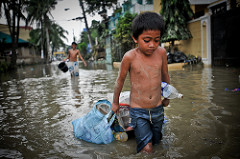clear
Are the present migration waves caused by climate change?
clear

source:
Asian Development Bank / Flickr
Migration is commonly considered to be a matter of choice and often this is pushed by economic necessity. Although we generally consider economic push factors to be mainly limited to globalisation, there can be little doubt that, in certain parts of the world, climate change is forcing mass migrations and particularly by populations who are affected by drought. Whether these waves of people on the move are considered as being environmental refugees or environmental migrants, is often a matter for debate, however often there are economic factors involved in driving the migration and the safety of the people is frequently not in doubt.
There are two factors directly related to temperature which can affect these migrations: one is a temperature beyond the range at which the human body can function and the other is temperature which results in famine situations. Currently around 1 million people live in environments which come into the first category, however as the rate of temperature increases, it is predicted that within 3 decades over 1 billion people will be left to reside in this kind of environment. Clearly then this has pushed a migratory move and, combined with the negative effects on agricultural production, this has brought many more people into the equation.
There is also a migration multiplier effect involved. This is thought to include the difficulties in accessing clean water, temperatures which fuel aggression within countries resulting in conflicts and wildfires which can further diminish resources of inhabitants.
 0
0
clear